#Arab Revolt Against the Ottoman Empire
Text
Jordan Independence Day Amman
Jordanian Flag Independence Day – Edarabia
May 25 is Jordan Independence Day, and the “most important event in the history of the country, marking its independence from the British government in 1946”. The 2023 celebration signifies 75 years since Jordan “officially gained full autonomy in 1948“.
King Abdullah I bin Al-Hussein
“Jordan’s independence took place during the reign of King Abdullah I…

View On WordPress
#Al Shareef Hussein Bin Ali – Emir of Mecca - King of the Hijaz - King of the Arabs#Arab League#Arab Revolt Against the Ottoman Empire#Autonomous Constitutional Monarchy#Council of the League of Nations#Emirate of Transjordan#Great Arab Revolt#Hashemite Army of the Great Arab Revolt#Hashemite Kingdom of Jordan#Hashemites#His Majesty King Abdullah I Emir of Transjordan 1921-1946#His Majesty King Abdullah II – King of the Hashemite Kingdom of Jordan 1999 to Present#His Majesty King Al Hussein – King of the Hashemite Kingdom of Jordan 1952-1999#His Majesty King Talal – King of the Hashemite Kingdom of Jordan 1951-1952#House of Hashem#Jordan 1946 Independence from the British Government#Jordan Houses – Senate - House of Representatives#Jordan Independence Day May 25#Jordan WWI Allies Britain and France#Jordanian Armed Forces#Khamaseen Winds#King Abdullah I bin Al-Hussein#King of the Hashemite Kingdom of Jordan 1946-1951#Ottoman Empire#Presentation of Colours Ceremony#Sharif Hussein of Mecca#The Emir#Transjordan#Transjordan Memorandum#United Nations
1 note
·
View note
Text
Mmmmm writing this story has just made me repeatedly run around the fact that there's no such thing as a pre-colonization way of writing about Copts even in fantasy
#Cipher talk#The thing is that. I've seen other copts talk about how we have a victim/martyr complex as a culture#(Sometimes leading to the Shit Ass Take that Copts who understand our identity through an Indigenous framework are perpetuating that)#Abd it's true. But part of why it's true is Copts have never been the first and last governors of themselves#The cultural context is by the time we start recognizably being Copts we have been put in a political situation where we're the lowest rung#Of society by dint of being Native Egyptians at least since Rome moved in a few centuries ago and were not being treated super well under#The Ptolemic dynasty if memory serves#The iconography of Coptic culture- aside from what we adapted of the old pagan religion and suprosing borrowing from Persia- is the#Iconography of those who had powers over us- empires and those they favored before us- repurposed to our own ends (Read is there any#Justification for the existence of Coptic art its a very good essay will send a link if asked)#It goes from Rome to Byzantium to Persia for a few years and then! Islamic conquest. And then! Mamluk dynasty. And then! Ottoman empire.#And then! France and Britain. And then! Not really independent sultanate. And then! Arab republic#Of course with the overlapping Amazigh control of Upper Egypt between 14-something and 1819?#Which. I love my Amazigh brothers and sisters. But we weren't treated well then either. The historical record is flawed but not good#And I! Hate this for us!#It could maybe have been different? I'd have to go back to the textbooks but I remember there were revolts in Egypt against Rome#That Early Copts probably participated in#Anyways. Tsuris pouring out my ears <3
4 notes
·
View notes
Text
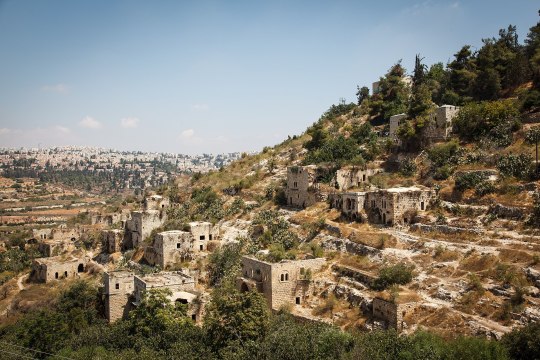
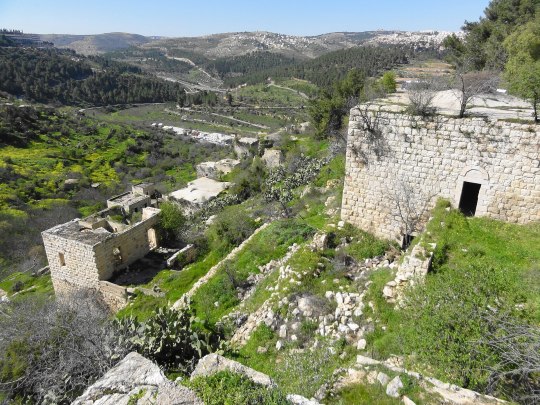
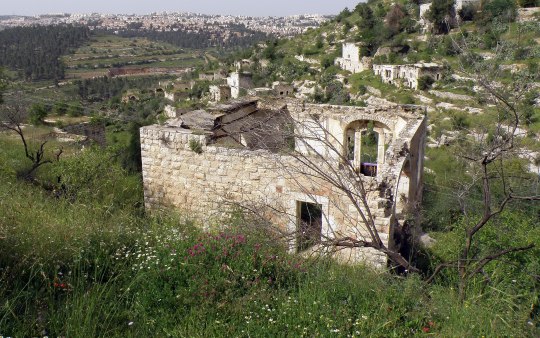
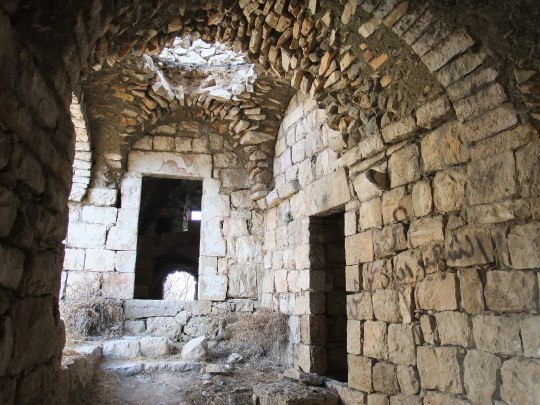
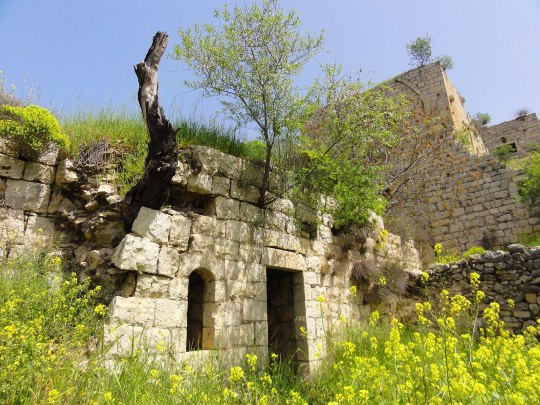
when the homes in the depopulated palestinian village of lifta were originally built is impossible to tell and most likely varies from house to house. the area's been known since ancient times, including having been written about in the hebrew bible. it's retained multiple different names throughout history - lifta by romans, nephto by byzantines, clepsta by crusaders, then lifta again by arabs. in more recent times, the area saw battle in the early 19th century, when it saw a peasant's revolt against egyptian conscription and taxation policies. (egyptian-ottoman ruler muhammad ali had attempted to become independent from the ottoman empire, and sought to use the area of "greater syria" which palestine was apart of as a buffer state.)
the village was predominantly muslim with a mosque, a maqām for local sage shaykh badr, a few shops, a social club, two coffee houses, and an elementary school which opened in 1945. its economy was based in farming - being a village of jerusalem, farmers would sell their produce in the city's markets. an olive press which remains in the village gives evidence to one of the most important crops its residents farmed. the historically wealthy village was known for its intricate embroidery and sewing, particularly of thob ghabani bridal dresses, which attracted buyers from across the levant.
lifta also represents one of the few palestinian villages in which the structures weren't totally or mostly decimated during the 1948 nakba. 60 of the 450 original houses remain intact. from zochrot's entry on lifta:

israel's absentee property law of 1950 permits the state to expropriate land and assets left behind, and denies palestinians the right to return to old homes or to reclaim their property. it's estimated that there's around 400,000 descendants of the village's original refugee population dispersed in east jerusalem, the west bank, jordan, and the palestinian diaspora.
like many depopulated palestinian houses, some of those in lifta were initially used to settle predominantly mizrahi immigrants and refugees, in this case 300 jewish families from yemen and kurdistan. the houses weren't registered in their names, and the area generally saw poor infrastructure and no resources including water and electricity provided by the government. most left in the early 1970s as a part of a compensation program to move out people who'd been settled in depopulated palestinian houses - if they didn't, they were referred to as "squatters" and evicted. (holes were even drilled in the roofs of evacuated buildings to make them less habitable). the 13 families which remain there today only managed to do so because they lived close to the edge of the village.
in 1987, the israeli nature reserves authority planned to restore the "long-abandoned village" and turn it into a natural history center which would "stress the jewish roots of the site", but nothing came of it. several more government proposals on what to do with the land had been brought up since then. this culminated in in 2021 when the israel land administration announced without informing the jerusalem municipal authorities that it issued a tender for the construction of a luxury neighborhood on the village's ruins, consisting of 259 villas, a hotel, and a mall. since 2023, they've agreed to shelve and "rethink" these plans after widespread objection.
the reasons for the objections varied significantly between the opposing israeli politicians - who see the village as an exemplar of cultural heritage and "frozen in time" model of palestinian villages before 1948 - and palestinians - who largely see the village as a witness of the nakba and a symbol of hope for their return. lifta is currently listed by unesco as a potential world heritage site, a designation netanyahu has threatened to remove several times.
many palestinians who are descendent from its former residents still live nearby. like with many other depopulated palestinian villages, they've never ceased to visit, organize tours of the village, and advocate for its preservation.
#palestine#info#nakba#my posts#the dresses link isnt specific to lifta thobs but provides a good overview#i couldn't find anything online abt lifta's embroidery but some of the book pdfs on palestinian costume i reblogged a while ago have info
399 notes
·
View notes
Text
To the Nonnie who asked me about the Druze and Bedouins in Israel, here's a recounting of the history of these two communities here.
The Druze in Israel
The Druze are members of an ethno-religion that split from Shiite-Isma'ili Islam in the 11th century in Egypt. For a while, people could join the Druze faith, but then that period was over, and since then, you can't convert to become a Druze. In order to maintain their ethno-religious group, they're not supposed to marry non-Druze. Most of the Druze originate and live in Syria, with small numbers in southern Lebanon and in northern Israel.
Most of the Druze who came to live in Israel, did so in the 16th and 17th centuries, when the Ma'an Druze rulers of Lebanon rebelled against the Ottoman (Turkish) Empire, and occupied northern Israel. Along the years, the Druze repeatedly attacked and stole from Israel's Jews. In the northern city of Safed, for example (one of the four holy Jewish cities, considered holy for ALWAYS having had Jewish presence, no matter what happened to Jews in Israel), notable Druze attacks against Jews happened in 1567, 1604, 1628, 1656 and 1838.
When did this change, and the relationship between the Jewish and Druze residents of the Land of Israel become better? Well, in 1936-1939, as Muslim Arabs in Israel (inspired by their antisemitic leader Haj Amin al-Husseini) attacked the Jews and the British in what came to be known as "The Arab Revolt," they also attacked the Druze, who intended to remain neutral in the fight between the Arabs and Jews. There were some Druze who did join Arab forces attacking Jews. Probably the most prominent Arab militia the Druze joined was the one led by Yussuf Abu Durra. This man used the opportunity of the revolt to attack Arab and Druze villages, and the latter target made his Druze fighters abandon him, and even start fighting against his militia.
These Arab attacks on the Druze pushed both them and the Jews to forge an actual alliance. Here's the example of the Druze village of Isfiya. It's built on the ruins of an ancient Jewish village, and the name Isfiya is a mispronunciation of the village's original Hebrew name, Husifa. How do we know this original name? Archeological digs in there revealed an ancient Jewish synagogue, with this mosaic, which includes the Hebrew words "Shalom al Yisrael" (peace upon Israel), as well as the name "Husifa":
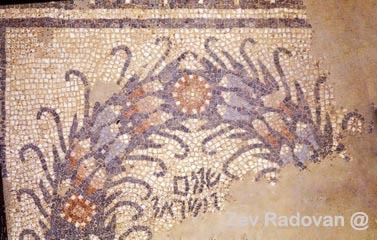
During The Arab Revolt, the village's leaders turned to the adjacent kibbutz Yagur. A Jewish underground movement called Hagana (Hebrew for 'defense,' because it was established 1920 to defend Israel's Jews from Arab attacks) had a group of fighters there, to defend the kibbutz. The Druze asked for the help of the Jews in defending their village from Arab attacks, and the Jews of Yagur agreed. They started collaborating, among other things the Druze provided the Jews with intel, and the Jews provided the Druze with weapons and ammunition. Isfiya's village council ended up incorporating the Jewish synagogue's mosaic into their emblem (this pic is from their Facebook page):
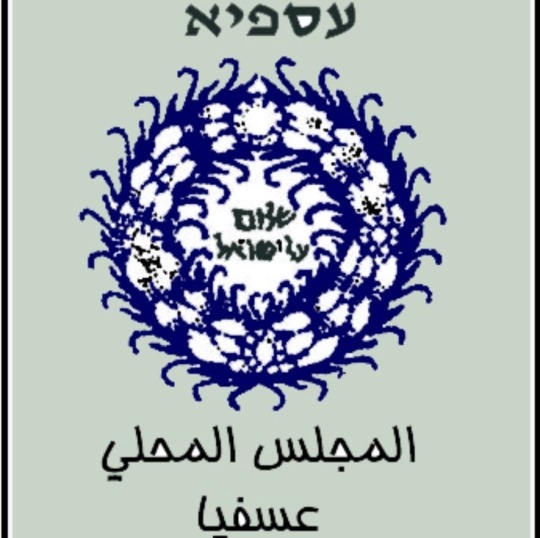
By the end of the revolt in 1939, most of the Druze were on the Jewish side, even if they weren't actively fighting. This opened the path for the same alliance to play a significant role in Israel's War of Independence from Nov 1947 to Jul 1949. There was one Druze unit that fought under Fawzi al-Qawuqji, an Arab commander from Lebanon, who led a militia in Israel during The Arab Revolt, collaborated with the Nazis during WWII, and then led the Arab Liberation Army during Israel's War of Independence War. BTW, this was the antisemitic emblem of the ALA:
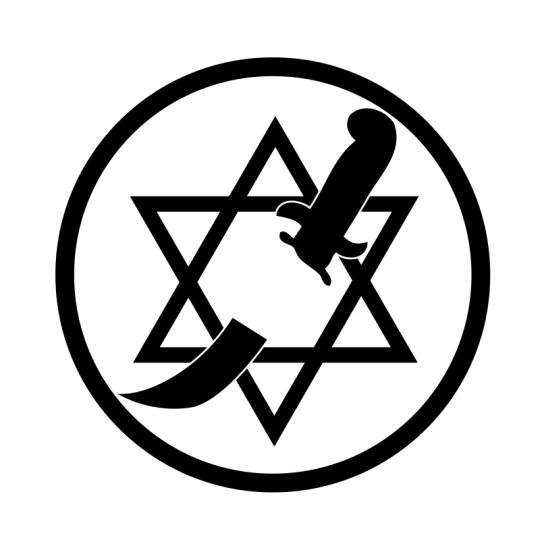
Fawzi al-Qawuqji sent his Druze unit to attack the Jews at the Ramat Yochanan battle, on Apr 16, 1948 (meaning, this is during the first stage of the war, when most Arab armies had not yet invaded the Land of Israel. That starts in May 1948). The Druze were defeated, and after that, all of the Druze in Israel were on the Jewish side.
So the answer to what forged the alliance between the Jewish and Druze residents of Israel, is a combination of the Muslim Arabs' violence at the time, and the fact that Jews were no longer a defenseless minority, but got to defend themselves by fighting back. NEVER underestimate the importance of the right to self defense, and the truth is that the only place in the world where Jewish people have this right as Jews is the State of Israel.
When the State of Israel was established, there were 14,500 Druze living here. Today, they number about 150,000 and make up roughly 1.5% of the Israeli population. Back in 1949, Druze service in the Israeli army was strictly voluntary. At the request of Druze leaders in Israel, this was changed in 1956, but the service is mandatory for just the men (while for Israeli Jews, it's mandatory for both men and woman, and for Arabs and Bedouins, it's still voluntary). They're recognized as the most loyal and contributing non-Jewish minority in Israel, and many Druze have reached some of the highest positions of power here.
The Bedouins in Israel
The Bedouins are nomadic tribes, originally native to Arabia (and in fact, while non-nomadic Arabs refer to them as Bedouins, from the Arabic word for 'desert,' they refer to themselves as Arabs, sometimes even as the "real Arabs"). Over the centuries, their routes have continuously expanded, taking them from the deserts of Arabia, through Israel, Jordan and Syria, to northern Africa. A part of what they would often do for a living is connected with herding and commerce, another part is attacking local communities along their wandering routes for loot. Most Bedouins had converted to Islam, and the Islamic conquests coming out of Arabia in the 7th century, taking over the rest of the Middle East, have helped in that expansion of their wandering routes.
In the 19th century, the Ottoman Empire (the Turks) wanted the Bedouins to be more settled, so they would be easier to govern. At the same time, the Ottomans wanted to artificially increase the Muslim population in Israel. So under them, in addition to European converts to Islam (mostly Bosnians and Albanians) settling in Israel, the Ottomans also forced many Bedouins to abandon their nomadic lifestyle and settle in Israel, mostly in the south, in the Negev desert. Some Bedouins completely settled, while some opted for a semi-nomadic life (meaning they still move from where they're staying at least twice a year, but it's not constant wandering, and they move between designated spots, over a relatively small distance).
The exact number of Bedouins in Israel before the establishment of the state is unknown due to the semi-nomadic lifestyle some of them still went by, but estimates are around 110,000 people. During the Independence War, most of the Negev Bedouins fled to Gaza (which came to be occupied by Egypt until 1967). After the state was founded, some returned to Israel. The state established seven villages and a city for them, the only Bedouin city in the world, Rahat (and the biggest Arab city in Israel). Today, the Bedouins in Israel number over 300,000 people in the Negev, about 110,000 people in towns and villages in northern Israel, and over 32,000 living in other cities across the country. They are about 3.5% of Israel's population.
The Bedouins have a more complex relationship with the State of Israel, due to several issues. The state has been seeking solutions for these problems, with varying degrees of success.
One issue is land ownership. You'd think it wouldn't be, with many still being semi-nomadic, but a part of the problem is that more than once, they will simply decide that if they've wandered to a certain spot enough times, it's theirs. In certain cases, these spots are in military zones, which means they're endangering themselves and soldiers by settling there even part time, and the state repeatedly has to evacuate them from those places, including for their own safety. More than once, anti-Israelis will talk about Israel destroying an ancient Palestinian village, and in reality it's a recent Bedouin settlement, where there's no proper infrastructure for them, including for their kids (no water lines, no electricity), and it's in the middle of a dangerous fire zone.
Another issue is polygamy, which is customary among Bedouins, but legally forbidden in the State of Israel. So again, it creates friction between men who want to marry multiple wives, and the authorities.
One more thing is that the traditionally nomadic lifestyle of the Bedouins means they've never really had a history of belonging to specific states, and feeling it's a part of their identity. So they don't feel too obligated to the state and its rule. One example is that they run their own courts. The Ottomans tried to dismantle those, and force the Bedouins to adhere to a Sharia court that they opened in 1906, but when the British took over Israel in 1917 they dismantled it, and allowed the Bedouins to have their courts, out of a colonialist perception that they're too savage to be able to accept western laws. So the Bedouins to this day have issues accepting the authority of the state's courts.
Having said all this, there are also Bedouins who are very loyal to Israel, feeling like the state has drastically improved their life in comparison with how they were treated before (under the British, and before them the Ottomans), or that they have better living conditions than they would have had without the state. Here's one Israeli Bedouin woman, Sophia Khalifa Shramko, speaking about how Israel has bettered their lives:
Also, while most of the Negev Bedouins fled during Israel's War of Independence, there were a few Bedouins from the northern part that fought for the state, and to this day, the northern Bedouins are known as the more loyal faction from among Israeli Bedouins. The state built several permanent settlements for the northern Bedouins, and today they live across 24 communities.
As I mentioned, army service is voluntary for the Bedouins. Over time, it went from a very small number who did serve in Israel's War of Independence, through a big decline in the 1980's, but then since 2002 there's been a small, but steady rise in the number of Bedouins choosing to enlist. In 2003, the first Bedouin woman insisted on serving (she had to fight many in her own society who objected to this, mostly for religious reasons), she succeeded, and opened the path for other Bedouin women to serve as well. There's no official or expert explanation offered for this, but you want my guess? In 2001, Hamas started firing rockets at Israel, and the most targeted are was the Negev, so as Palestinian terrorists made it clear they have no qualms about killing Bedouins simply for being citizens of the Jewish state, my guess is more Bedouins who didn't identify with the state protecting them from Hamas, started to. I think following the Oct 7 massacre, in which at least 19 Bedouins were murdered by Hamas, at least 6 were kidnapped, and dozens are still considered missing, the Bedouins' identification with Israel is at an all time high. We've seen collaborations of Jews helping Bedouins, and Bedouins helping Jews, reaching an unprecedented peak.
Before the Oct 7 attack, the overall number of Bedouins serving was still rather low. In 2021, it was a total of 1,500 people. All the same, Israel has built a special commemoration site for the Bedouin soldiers, including several monuments. Here's one (you can see the Arabic writing at the top if you click the pic):
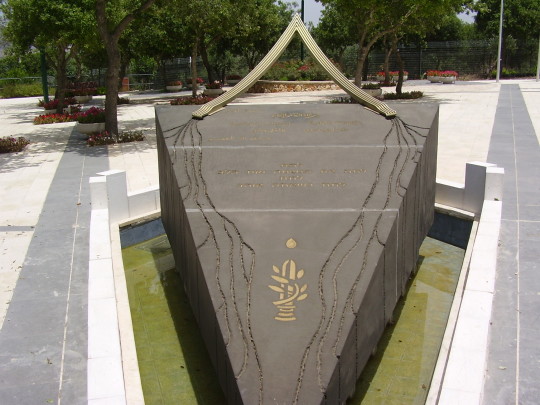
Israel as the Jewish nation state
The State of Israel is the Jewish nation state. That's not different to other nation states. But I want to emphasize, being a Jewish state, doesn't mean it's a Jew only state. It never was, it was never meant to be, it never will be.
Yes, on the national level, it has Jewish characteristics. The official language is Hebrew, the state calendar follows the Hebrew one, it has Jewish symbols in the flag and state emblem. And Israel also has a law of return for Jews, so they would never have to fear persecution elsewhere ever again. It allowed the saving of Jews from Syria when the civil war started there in 2011, or more recently the war in Ukraine, it allowed Israel to support Jews fleeing rising antisemitism in places like France in the last few decades, and it allows Jews one place where they don't have to constantly adjust themselves to the dominant non-Jewish culture, where they don't have to live by a Christian or Muslim or Buddhist calendar, where they can speak, and consume culture, and create it in their own native language, where they don't have to consider whether they can find a synagogue or kosher food before they move to a certain town, where they get to walk down the same paths their ancestors did thousands of years ago, where they will never be told that Jewish boys wearing a kippah to school is prohibited, and so on.
Every single one of these elements can be found in at least one other country out there, and very much so in nation states. Britain is quite clearly a Christian country when the head of the state is also the head of the church, so is the US when Christmas is a national holiday, but Yom Kippur isn't. Germany is the nation state of the Germans, its language is German (not Turkish, as much as there is a big Turkish community there), the Bundestag, the German parliament building, has a writing dedicating it to "Dem Deutsche Volk" (the German people), and it has a law of return for people of German descent, returning from eastern European countries. In this sense, nothing about Israel as the Jewish nation state is out of the ordinary.
Israel can and should do everything in its power to make life here good for the non-Jewish communities. By law, they have the same civil rights as the Jews. At the same time, these communities actually have less obligations when it comes to army service. Are things perfect? No, and Israel should continue to work on it, always. Just like every country should continuously strive to be better for its minorities. But if the Jewish character of the State of Israel troubles you, ask yourself why are the Jews the only ones not allowed to have a nation state of their own? One place upon the earth, where they're not the minority, in case being a minority elsewhere is something that's become too difficult or too dangerous? Or if they simply want to go back to their roots, to their people and to their ancestral land?
Am Yisrael Chai!
(for all of my updates and ask replies regarding Israel, click here)
#israel#israeli#israel news#israel under attack#israel under fire#terrorism#anti terrorism#antisemitism#hamas#antisemitic#antisemites#jews#jew#judaism#jumblr#frumblr#jewish
175 notes
·
View notes
Text
by Matti Friedman
The little book may have been kept by a Jewish family in Bamiyan, the curator suggested, with different people adding new texts as the years passed. The hands of at least five scribes are evident in the pages. They were influenced by ideas and writing coming from both major Jewish centers of the time—Babylon, which is modern-day Iraq, and the Land of Israel, where Jewish sovereignty had been lost seven centuries before and whose people were now under Islamic rule.
The previously unknown poem shows the influence of a familiar biblical text, the erotic Song of Songs, according to Professor Shulamit Elizur of the Hebrew University, the member of the research team in charge of the poem’s analysis. But it also shows the impact of an esoteric Jewish book that wasn’t part of the Bible, known as the Apocalypse of Zerubbabel. This book is thought to have originated in the early 600s, when a brutal war between Byzantium and the Sasanian empire of Persia generated desperate messianic hopes among many Jews. Whoever wrote the poem in the Afghan prayer book had clearly read the Apocalypse, Elizur said—giving us a glimpse of a Jewish spiritual world both familiar and foreign to the coreligionists of the Bamiyan Jews in our own times, 1,300 years later. The previously unknown poem shows the influence of a familiar biblical text, the erotic Song of Songs, according to Professor Shulamit Elizur of the Hebrew University. (Museum of the Bible)
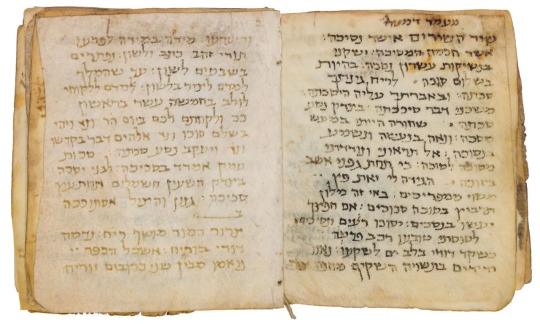
Chapters of the book’s journey from Afghanistan to Washington are unclear—some because they’re simply unknown even to the experts, and others because that’s the way the people in the murky manuscript market often prefer it.
When the book was discovered by the Hazara militiaman, according to Hepler, the tribesmen didn’t know exactly what it was but understood it was Jewish and assumed it was sacred. The local leader had it wrapped in cloth and preserved in a special box. At one point in the late 1990s, it seems to have been offered unsuccessfully for sale in Dallas, Texas, though it’s unclear if the book itself actually left Afghanistan at the time.
After the al-Qaeda attacks of 9/11 triggered the U.S. invasion of Afghanistan, the book disappeared for about a decade. In 2012 it resurfaced in London, where it was photographed by the collector and dealer Lenny Wolfe.
Any story about Afghan manuscripts ends up leading to Wolfe, an Israeli born in Glasgow, Scotland. I went to see him at his office in Jerusalem, an Ottoman-era basement where the tables and couches are cluttered with ancient Greek flasks and Hebrew coins minted in the Jewish revolt against Rome in the 130s CE. It was Wolfe who helped facilitate the sale of the larger Afghan collection to Israel’s National Library. “The Afghan documents are fascinating,” he told me, “because they give us a window into Jewish life on the very edge of the Jewish world, on the border with China.”
When Wolfe encountered the little prayer book, he told me it had already been on the London market for several years without finding a buyer. In 2012, the year he photographed the book, he said it was offered to him at a price of $120,000 by two sellers, one Arab and the other Persian. But the Israeli institution he hoped would buy the book turned it down, he told me, so the sale never happened. Not long afterwards, according to his account, he heard that buyers representing the Green family had paid $2.5 million. When I asked what explained the difference in price, he answered, “greed,” and wouldn’t say more. (Hepler of the Museum of the Bible wouldn’t divulge the purchase price or the estimated value of the manuscript, but said Wolfe’s figure was “wrong.”)
The collection amassed by the Green family eventually became the Museum of the Bible, which opened in Washington in 2017. The museum has been sensitive to criticism related to the provenance of its artifacts since a scandal erupted involving thousands of antiquities that turned out to have been looted or improperly acquired in Iraq and elsewhere in the Middle East. The museum’s founder, Steve Green, has said he first began collecting as an enthusiast, not an expert, and was taken in by some of the dubious characters who populate the antiquities market. “I trusted the wrong people to guide me, and unwittingly dealt with unscrupulous dealers in those early years,” he said after a federal investigation. In March 2020 the museum agreed to repatriate 11,000 artifacts to Iraq and Egypt.
20 notes
·
View notes
Text

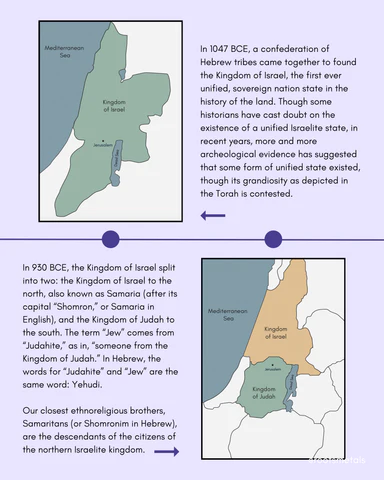
In 1047 BCE, a confederation of Hebrew tribes came together to found the Kingdom of Israel, the first ever unified, sovereign nation state in the history of the land. Though some historians have cast doubt on the existence of a unified Israelite state, in recent years, more and more archeological evidence has suggested that some form of unified state existed, though its grandiosity as depicted in the Torah is contested.
In 930 BCE, the Kingdom of Israel split into two: the Kingdom of Israel to the north, also known as Samaria (after its capital “Shomron,” or Samaria in English), and the Kingdom of Judah to the south. The term “Jew” comes from “Judahite,” as in, “someone from the Kingdom of Judah.” In Hebrew, the words for “Judahite” and “Jew” are the same word: Yehudi.
Our closest ethnoreligious brothers, Samaritans (or Shomronim in Hebrew), are the descendants of the citizens of the northern Israelite kingdom.
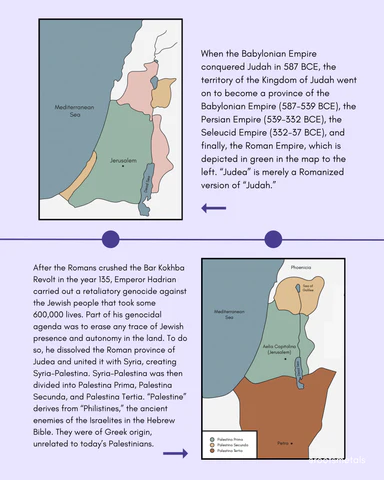
When the Babylonian Empire conquered Judah in 587 BCE, the territory of the Kingdom of Judah went on to become a province of the Babylonian Empire (587-539 BCE), the Persian Empire (539-332 BCE), the Seleucid Empire (332-37 BCE), and finally, the Roman Empire, which is depicted in green in the map to the left. “Judea” is merely a Romanized version of “Judah.”
After the Romans crushed the Bar Kokhba Revolt in the year 135, Emperor Hadrian carried out a retaliatory genocide against the Jewish people that took some 600,000 lives. Part of his genocidal agenda was to erase any trace of Jewish presence and autonomy in the land. To do so, he dissolved the Roman province of Judea and united it with Syria, creating Syria-Palestina. Syria-Palestina was then divided into Palestina Prima, Palestina Secunda, and Palestina Tertia. “Palestine” derives from “Philistines,” the ancient enemies of the Israelites in the Hebrew Bible. They were of Greek origin, unrelated to today’s Palestinians.
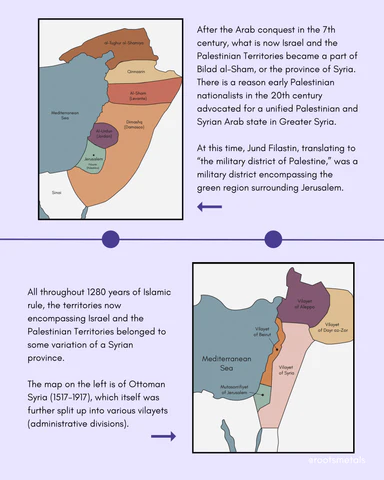
After the Arab conquest in the 7th century, what is now Israel and the Palestinian Territories became a part of Bilad al-Sham, or the province of Syria. There is a reason early Palestinian nationalists in the 20th century advocated for a unified Palestinian and Syrian Arab state in Greater Syria.
At this time, Jund Filastin, translating to “the military district of Palestine,” was a military district encompassing the green region surrounding Jerusalem.
All throughout 1280 years of Islamic rule, the territories now encompassing Israel and the Palestinian Territories belonged to some variation of a Syrian province.
The map on the left is of Ottoman Syria (1517-1917), which itself was further split up into various vilayets (administrative divisions).
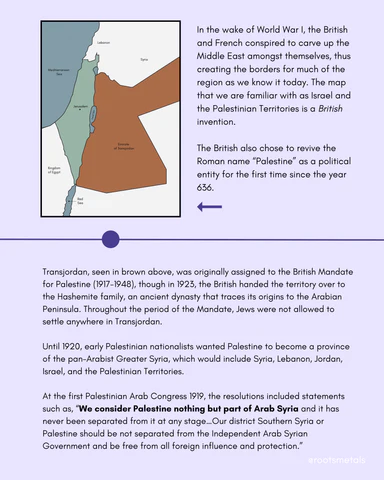
In the wake of World War I, the British and French conspired to carve up the Middle East amongst themselves, thus creating the borders for much of the region as we know it today. The map that we are familiar with as Israel and the Palestinian Territories is a British invention.
The British also chose to revive the Roman name “Palestine” as a political entity for the first time since the year 636.
Transjordan, seen in brown above, was originally assigned to the British Mandate for Palestine (1917-1948), though in 1923, the British handed the territory over to the Hashemite family, an ancient dynasty that traces its origins to the Arabian Peninsula. Throughout the period of the Mandate, Jews were not allowed to settle anywhere in Transjordan.
Until 1920, early Palestinian nationalists wanted Palestine to become a province of the pan-Arabist Greater Syria, which would include Syria, Lebanon, Jordan, Israel, and the Palestinian Territories.
At the first Palestinian Arab Congress 1919, the resolutions included statements such as, “We consider Palestine nothing but part of Arab Syria and it has never been separated from it at any stage…Our district Southern Syria or Palestine should be not separated from the Independent Arab Syrian Government and be free from all foreign influence and protection.”
ORIGINS OF ISRAEL
The earliest known mention of “Israel” in history — and the earliest mention of Israel outside of the Torah — is 3200 years old and was discovered in Thebes, Egypt, in 1896.
The mention is found in what is known as the Merneptah Stele, an inscription by the ancient Egyptian pharaoh Merneptah, who reigned between 1213 BCE to 1203 BCE. The Stele itself is dated to 1208 BCE. It’s written in ancient Egyptian hieroglyphs.
The Merneptah Stele mainly describes Merneptah’s victory over the ancient Libyans. However, three of the 28 lines talk about a separate Egyptian military campaign in Canaan. It reads:
“The Canaan has been plundered into every sort of woe:
Ashkelon has been overcome;
Gezer has been captured;
Yano’am is made non-existent.
Israel is laid waste and his seed is not;
Hurru is become a widow because of Egypt.”
The hieroglyphs used describe Ashkelon, Gezer, and Yano’am as city-states, whereas “Israel” is described as a foreign (to Egypt) people. This suggests that at this point in time, the Israelites did not rule over a unified state, but rather, were a nomadic or semi-nomadic tribe(s). This would corroborate the narrative of the Torah, as the Kingdom of Israel did not become a unified state until some 161 years later.
As a side note, it’s interesting that the first ever mention of Israel in history comes from a ruler bragging about our supposed destruction. Over three millennia later, here we are.
In 1040 BCE, a loose confederation of Hebrew tribes united to form the first centralized state in the Land of Israel, known as the Kingdom of Israel.
The Hebrew tribes originated -- and later split away -- from the Canaanites, a loose group of semi-nomadic tribes that lived during the second millenium BCE; they were the original inhabitants of the Land of Israel. Though depicted as the enemies of the Israelites in the Torah, archeologists, linguists, Biblical historians, and geneticists today widely agree that the ancient Hebrews were originally Canaanites themselves. The Tanakh itself even makes some vague references to the Hebrews’ Canaanite origins. Ezekiel 16:3 tells us, “Thus said the sovereign God to Jerusalem: by origin and birth you are from the land of the Canaanites — your father was an Amorite and your mother a Hittite.” The Amorites were a Canaanite people.
It was customary at the time and in the region for nations to name themselves after their most important deities. For example, Israel’s neighboring Assyria named itself after the Mesopotamian deity “Ashur.” “El” was the most important god in the Canaanite pantheon; over time, the cult of El and of the southern deity YHWH merged to form the Hebrew God as we know Him today. “Israel,” then, translates to “one who wrestles with El [that is, God].”
Until 1948, the United Kingdom of Israel (1047-930 BCE), the southern Kingdom of Israel (930-722 BCE), and the Kingdom of Judah (930-587 BCE) were the only ever sovereign nation states in the entirety of the land’s history. At all other times, the region was a colony, vassal state, or province of some foreign empire whose administrative center was elsewhere. The founding of the State of Israel in 1948 marked the first time that the land belonged to a fully sovereign, independent state in over 2500 years.
ORIGINS OF PALESTINE
Historians have long debated the origins of the name “Palestine.” Most believe that the word derives from the Hebrew and Ancient Egyptian word “peleshet,” translating to “invader” or “migratory.” “Peleshet” was used to describe the Philistines, who settled on the Mediterranean coastline above Egypt, in parts of what is now Israel and Gaza. The Philistines were a seafaring people of Greek origin, entirely unrelated to today’s Palestinians, who are an Arab ethnonational group. Some Palestinians, particularly Christian Palestinians and Palestinians from the city of Nablus, have Jewish and Samaritan ancestry, respectively.
The first use of the word “Palestine” to describe a geographic region was in the 5th century BCE, at least 700 years after the first use of the word “Israel.” Like the Land of Israel, “Palestine” was a loose region, describing the coastal strip that runs from Egypt to Lebanon. However, unlike “Israel,” Palestine was not a political entity until the Romans renamed Judea “Syria-Palestina” in the second century CE.
Another, newer, more controversial theory asserts that “Palestine” derives from the Greek word “Palaistes,” meaning “wrestler.” If you recall, the term “Israel” means “one who wrestles with God.” According to this theory, “Palestine” is a direct Greek translation of “Israel.”
For hundreds of years, the term “Palestinian” was virtually synonymous with “Jew.” In the 18th century, for example, Immanuel Kant described the Jews in Europe as “the Palestinians among us.” In the early 20th century, Jews used “free Palestine” as a rallying call to establish a Jewish state.
The first Arab Palestinian to identify as Palestinian was Khalil Beidas in 1898, though the term was not universally used until the 1960s. During the 1937 Peel Commission, Palestinian Arab nationalist Anwi Abd al-Hadi told the British, “Palestine is a term the Zionists invented!”
WHY IS THE STATE OF ISRAEL "ISRAEL"?
Though the second Kingdom of Israel was conquered by the Assyrians in 722 BCE, both Jews and Samaritans continued referencing to the land as “Eretz Israel,” or the Land of Israel, for three millennia. When the Maccabees briefly gained a semblance of independence after the Maccabean Revolt (167-141 BCE), they referred to their new semi-autonomous kingdom as “Judea” and “Israel” interchangeably. During the Bar Kokhba Revolt against the Roman Empire (132-135 CE), the revolt leader, Simon Bar Kokhba, was known as the “prince of Israel.”
Even during the British Mandate (1917-1948), the official name of Palestine was the “British Mandate of Palestine (Aleph Yud).” Aleph Yud are the letters corresponding to the abbreviation for “Eretz Israel,” the Land of Israel.
Even so, most assumed that the new Jewish state would be called “Judea,” or “Yehuda” in Hebrew. In 1949, on the first anniversary of the State of Israel, Zeev Sharef, who had been present during the deliberations, explained why the name “Judea” was quickly discarded: “Most people had thought that the state would be called Judea. But Judea is the historical name of the area around Jerusalem, which at that time seemed the area least likely to become part of the state...So Judea was ruled out.”
The Provisional Government of the State of Israel also spent some time deliberating on what the name for the country would be in Arabic. Initially they considered Palestine, or "Filastin" in Arabic, to "take the feelings of the Arab minority into account." But the idea seemed too confusing, because they assumed an Arab state would be established alongside the Jewish state, and that Arab state would likely be called Palestine. As such, the idea was discarded. Instead, Israel is called "Isra'il" in Arabic.
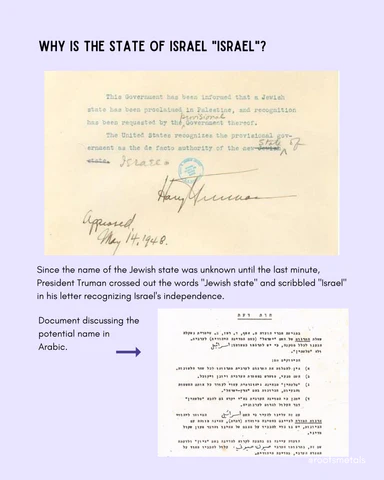
Since a lot of you guys seem to have a problem with reading comprehension, let me comprehend this for you: the point of this post is *not* to say only Jews have a right to live in the land, or to say that I unequivocally support everything the Israeli government has done, is doing, & will continue to do forever into eternity.
the point is: (1) the idea that Israel is “colonial” is ahistorical & antisemitic because it is a blatant erasure of Jewish history & identity, (2) the idea that Palestine is “anti-colonial” is also ahistorical and also an erasure of Jewish history, & (3) the “river and the sea” that you’re so damn attached to in the name of “anti-imperialism”?Yeahhhh those borders were a British invention.
For a full bibliography of my sources, please head over to my Instagram and Patreon.
26 notes
·
View notes
Text
Jews are natives to the Middle East as well and have been ethnically cleansed from nearly every city from Beirut to Medina:
Cyrus the Great returned Jews to their homeland in Jerusalem before the Arab conquests or Islam even existed. Even the prophet Muhammad himself acknowledged Jerusalem as the Jewish homeland. After the prophet came into conflict with Jews in Yathrib (Medina) he switched from praying to Jerusalem to prayer towards Mecca. Zionism started off with visionary Jews in Europe realizing they should leave due to antisemitism before the holocaust. They pooled their money together and purchased low value land from Arab landlords in Israel. The reason the 48 and 67 borders get mentioned all the time is because it was after failed Arab invasions Israel gained the most land and took land for security. There have been deals on the table from the Peels commission to Ehud Barak’s deal and the Arabs or so called Palestinians said no to their own state every time. More recently they voted for Hamas. It is obvious the Arabs or so called Palestinians want war and still have antisemitism, Arab imperialist mindset. If the so called Palestinians wanted peace and a state they would have taken a deal by now. Arafat was a strongman from Egypt recruited by the KGB to lead the so called Palestinians. Arafat said no to the best deal he was ever going to get from Ehud Barak for a Palestinian state. The Arabs got the war they want and then complain endlessly about the hell that war is. Arabs also have a horrific history of imperialism. The Zanj revolt was the largest slave revolt ever in history against Arab oppression. The reason the land Zionists purchased was considered low value is because it was a backwater of the Ottoman Empire previously.
10 notes
·
View notes
Note
I mean this with ZERO disrespect, I'm simply trying to educate myself on this matter because it impacts us all.
All I can find about the Israel-Palestine conflicts is the fighting. What I want to know is why.
Whats the backstory? Why are they fighting? Why is everyone persecuting one another and who in the government is responsible?
I heard Hamas bombed Gaza and has taken hostages. What brought on this violence? Do all the Palestinians agree with this?
(More personal opinion questions, you don't need to answer these)
Do you agree with Hamas? Do you think that violence was a last resort to free Palestine? Do you think it's justified?
One thing I do hate is people saying "I hate *this group of people*, they are bad." They can't all be bad. So I don't like the titles of Anti-Israel/Anti-Palestine because you're assuming everyone there is on the same side.
In conclusion, people are stupid. The government is messed up. Citizens and families want to live so why won't the government let them?
I’m genuinely grateful that you’re asking because educating ourselves is one of the greatest tools we have. I’ll break it up into sections.
1. What’s the backstory?
In 1918, the Ottoman Empire conceded land they controlled to Britain (this is still an ongoing problem regarding many, many things because the Ottoman Empire controlled many nations that weren’t theirs to control if you catch my drift. Look up the Elgin marbles for a fun wormhole of WTF Britain). The Arab Revolt was backed by France and Britain with the promise that if the Arab fighters could force the Ottomans out of the area of the Levant, they would be granted independence (McMahon-Hussein Correspondence) but, plot twist, France and the UK instead split the region (Sykes-Picot Agreement). The Balfour Declaration of 1917 expressed Britain’s support of the creation of Israel. After they gained control of the region, they established Israel and systematically began to take the land of Palestinians.
Note: Zionism began as a belief in the mid-18th century. Many, MANY Jewish people do not subscribe, encourage, or promote the idea of a Jewish state. I do not view Israel = Jewish because it is antisemitic to imply that the Jewish diaspora all exist under the state of Israel. Especially when many Jewish people disagree with Israel.
Note note: Zionism was created as a response to the numerous pogroms and other antisemitic hate crimes affecting Jewish people. the Holocaust was fucking awful. No ifs ands or buts. Genocide doesn’t justify genocide, however.
Continuing on. So, clearly, the Palestinians are pissed. They were promised independence and instead now have their land taken by a global superpower who has historically fucked over hundreds of countries (another wormhole for you: India under British rule, Ireland and literally all of its history with England, the transatlantic slave trade under Britain, Africa under British rule, Australia and the treatment of Aboriginals under British rule, America and the British, it goes on). Palestinians revolted from 1936-1939 because, again, their home and promise of independence was being stolen. They lost against the British army but then 1939 was a bit of an important year for everyone and they world was sucked into another world war.
With WWII saw the birth of the United Nations, an organization that might sound important but has the moral backbone with the equivalence of a chocolate eclair. The UN said “hey, why don’t we split Palestine and Israel into two different states so maybe they’ll stop fighting” (United Nations Partition Plan for Palestine) and, as a result, the 1948 Palestine-Israel war began. Hundreds died. 700k+ people were forced from Palestine and spread across the world in what is called the Nakba. Israeli colonizers quite literally moved into homes that had been occupied by Palestinians only days before. In 1918, the Jewish population of the region was 8.1%. In 1948, when Israel was recognized as a nation by the UN, the Jewish population of the region was 82.1%.
2. There’s plenty of infographics and videos explaining the next few decades but I’m already writing an essay basically so the gist is: Palestinians keep losing their homes and Israel keeps taking them. Israel forces the Palestinians into smaller and smaller parcels of land until the control virtually everything but a small strip of land (Gaza) and the West Bank. That brings us to 2006.
Hamas was elected in 2006 over rivaling Fatah, gaining majority amount of seats in the Palestinian Legislative Council under the promise that they would help end the corruption many Palestinians were frustrated with. Instead they took military control over Gaza and established an autocratic state over millions of people who were already suffering under barbaric policies and practices from Israel. Politicians.
This is where things get a little…messy morally. Do I agree with Hamas? Fuck no. I couldn’t care less about Hamas because they don’t care about Palestinians. Do all Palestinians agree with Hamas? Firstly, you will rarely find a group of people where all agree with some. Secondly, I don’t think they appreciate being bombed by Israel while Hamas leaders chill somewhere else. The people of Palestine are the victims of Hamas and Israel.
Did some Palestinians celebrate Hamas’ actions? Yes. Do I think violence is a last resort? Yes and no. Do I think it’s justified? Yes and no.
Lemme expand on those last two points. I want to be an international human rights attorney someday. The loss of innocent life is always a fucking tragedy that I hope to help prevent or to bring justice for them. I understand violence. I understand why people are so angry. I understand the rage and grief Palestinians feel. 75 years of having their rights stripped away, their homes quite literally occupied, their land and culture chipped away piece by piece, and their children bombed and shot at.
“But how on earth can you think violence is justified if people get hurt!” The American Revolution was an act of violence that got numerous people killed yet you will rarely find someone who won’t justify it. Ukraine defending themselves against Russia wanting their land with no regard to how many Ukrainians they kill is considered justified.
People just seem to focus on the “violence is bad” aspect of things once POC are involved. Yeah, I said it. Americans tired of taxation, of British rule, and of not having their independence causes property damage, argues with soldiers in the streets, and starts a war is okay but when Palestinians do it, it’s a problem? When Black Americans ask to stop being brutalized by the police, it’s a problem? When Black South Africans ask to end an apartheid state, it’s a problem? When Central Americans ask for western nations to stop causing coups that destabilizes their nations, it’s a problem? I could go on.
Yeah, violence is bad. Violence is also the way that a lot of countries are where they are today. Violence is sometimes the only reason why things changed. Violence is enacted on the oppressed everyday yet people only seem to really care once the oppressed fight back.
3. I’m anti-Israel because I don’t agree with the government and the state of Israel. I don’t agree with their 75 years of violent oppression of Palestinians. I don’t agree with their current or past actions. I’m anti-Hamas. I think they’re a vacuous organization that is more focused on getting what they want than considering the consequences of innocent Palestinians.
I’m also really fucking furious at Joe Biden’s insistence that we send aid to Israel. We have given Israel $260 BILLION since 1948. BILLION. And yet we have people dying because they can’t afford healthcare. Students leaving school because they can’t afford tuition. We have 8 year olds in debt because they can’t afford school lunches. The unhoused population is growing rapidly due to the housing crisis. I can sense the unemployment rate creeping higher. I know many people who have lost their jobs this past month alone. We’re days away from another government shutdown and they can’t vote on a speaker.
American politicians would rather send Israel billions more to bomb innocent people than to feed their own citizens. That, in my opinion, is a sort of violence that can never be justified.
#honey.txt#sorry for the essay#but really not sorry#I took a whole class on the global south during the Cold War and it really opened my eyes#granted my specialization is Central America but plot twist#America has been at the center of fucking stuff up there too
36 notes
·
View notes
Text
i think what a lot of people need to understand about dune is that frank herbert watched lawrence of arabia which is a movie based on the real life account of a real man who fought alongside arab tribes and peoples in a revolt against the ottoman empire. It's also a scathing takedown of the white saviour, just a clinical excision of why exactly there's no such thing. It paints a vivid picture of british imperialism and why 'good men' working from within said empire can do fuck all to help liberate anyone. it's also a really heartbreaking gay love story, and it gave the world one of the greatest romantic heroes in Sherif Ali.
Frank Herbert saw all that and decided, but what if it was homophobic instead, and there was desert cocaine and worms, and the white saviour had superpowers as a result of eugenics.
#i'm being facetious here#but like let's cool it with the declarations that dune is like a masterpiece or something#also with villeneuve as this great director#this is the guy who introduced a completely irrelevant sinophobic plotpoint in arrival when the short story that inspired the movie#was written by a chinese author and had no such thing#just absolutely rancid of him to do that in what is otherwise a good movie#i wish people engaged critically with the things they liked!
18 notes
·
View notes
Text
image ID for infographics:
orientalism
If your Instagram bio has On [Indigenous name] land and you've been calling Israel "Isnotreal or Israhell", we need to talk.
Referring to "Israel" as "Isnotreal, Israhell, Isr*el, "Israel"," and such is
anti-Indigenous, antisemitic, and Orientalist.
Let's start with some history.
Archaeologists date the first archaeological record of a reference to Israel to 1205 BC.
And indeed, secular historical record clearly points to The Kingdom of Israel existing on this land. The Kingdom of Israel was a nation made up of tribal peoples called Israelites. Israelites are understood to have been descendants and not conquerors of Canaanites and then the Hebrew tribes. Today, several peoples have Israelite ancestry.
Jews and Samaritans are peoples whose ethnogeneses stem from Israel and who fit all the criteria for Indigeneity. Secular history, archaeology, anthropology, linguistics, genetics, understandings of ethnicity, migration, and Indigeneity, and more support this.
"Wait, I thought this whole land was called Palestine first?"
Nope! Let's pick up where we left off. Israel then got conquered by empire after empire. This is that imperialism you hate so much. Some of these rulers included: Assyrian, Babylonian, Persian, Greek, Roman, Byzantine, Arab, Crusader, Mamluk, Ottoman, and British.
During Roman Empire rule, the region was called Judea, after The Kingdom of Judah, which was a southern Israelite kingdom (Jew literally means of Judah). However, with the Indigenous Jews trying to revolt against imperial rule, the Roman imperialists renamed the land from Judea to Syria- Palaestina. Palaestina is understood to come from Pelishtim aka the Phillistines, a Greek people who had earlier come to settle on land in the region, battled the Indigenous Israelites, and are unrelated to modern day Palestinians. It thought that the Romans renamed the region this to humiliate and punish the Jews for attempting to resist imperialism and to try to sever their Indigenous ties to the land.
When future empires conquered the land, this name given to it by imperialists stuck. The Byzantine Empire used Palaestina Prima, Secunda, and Salutaris; the Arab Empire used Jund Filastin; the British Empire used Mandatory Palestine.
Why is it called Israel today?
Jews, who maintained a presence on their Indigenous land while being persecuted by conquering empire after conquering empire, finally declared independence from imperialism (the British Empire this time) in 1948.
This is an example of an Indigenous people seeking and achieving self-determination on their Indigenous land. As we've covered, Jews are a nation with tribal origins (despite the modern framing of them as more of a religious group, which comes in part from their colonizers' attempts to control them, by the way). Take a look at Cherokee Nation's mission: "The Cherokee Nation is committed to protecting our inherent sovereignty, preserving and promoting Cherokee culture, language and values, and improving the quality of life for the next seven generations of Cherokee Nation citizens."
Indigenous peoples all around the world want these things.
When deciding what to call the modern state that would be a re-establishment of an Indigenous nation finally free again from imperial rule, Israel using a pre-colonial name like Israel was an act of decolonization. It is thought that they went with Israel (over, say, Judea) to be more historically geographically accurate and inclusive of non-Jewish citizens.
If you live in America and aren't Native American, you may have guilt over being a beneficiary of settler colonialism.
Writing On [Indigenous name] land in your Instagram bio may make you feel better about living on stolen land. It is also a fairly empty gesture in that it doesn't do a ton for Native Americans and takes essentially no sacrifice from you. You don't have to give up any of the privilege you've accrued as a beneficiary of settler colonialism.
Telling people in SWANA to get off their Indigenous land may be a way you are assuaging said guilt. But let's be clear: this is anti- Indigenous, antisemitic, and Orientalist. The irony of your telling Indigenous people to get off land to which they're Indigenous while you chill on land to which you're not? Palpable.
Jews aren't a scapegoat for your guilt. Take a look in the mirror and at history and realize you are in a way more whom you accuse Jewish Israelis of being than they are, and you've said they were deserving of being burned alive in their homes, tortured, mutilated, SAed, and more. What might it be like to apply that logic to you? (Though to be clear, Jews are Indigenous to Israel whilst you are not to America.)
While land back by any means necessary may sound sexy and righteous to you for those people over there (again, it doesn't even accurately apply since Jews are Indigenous to Israel), if it were applied to you, you'd be the subject of violence. Promoting violence in SWANA but not wanting it for yourself reeks of Orientalism. Your comfort with violence against Jews enmeshed in erasure, double standards, and scapegoating is antisemitic.
If you care so much about Indigenous people, stop telling Indigenous people to get off their Indigenous land. Maybe focus a bit more on the Indigenous land you, not a Native American, are occupying.
Advocacy for Palestinians need not erase Jewish history.
Living in the West telling Indigenous peoples of SWANA who they are and what to do is Orientalist.
Disagreeing with actions of the Israeli government isn't a free pass making it ok for you to be antisemitic, anti-Indigenous, or Orientalist.
Soviet Antisemitism and Candace Owens:
The antisemitic Soviet propaganda that got Candace Owens, explained:
Background of Soviet antisemitism.
Many are unaware of how antisemitism, at its peak, inspired Soviet propaganda through anti-Zionism. The Soviet Union created and disseminated anti-Zionist conspiracies after initially siding with Israel, then becoming threatened by Israel's growing alliance with the U.S. Observing this threat, the Soviets quickly unleashed some of the most commonly known anti-Zionist theories, today often repeated by fringe leftists, such as:
"Zionism is racism"
"Zionism is elitism"
"Zionism is colonialism"
"Zionism is American imperialism"
"Zionism oppresses people of color"
"Zionism is bourgeoise classism”, and the like.
In addition, the Soviets argued that anti-Zionism was "not
antisemitism," because many Jews endorsed their theories.
Historians argue that the UN's adoption of Resolution 3379 determining that "Zionism is racism" (later revoked by resolution) was orchestrated by the Soviet propaganda machine.
Soviet Anti-Zionism quickly perpetuated communist circles, concretized in writing and becoming required reading in educational & military institutions.
Soviet Holocaust Distortion and Holocaust Inversion.
Alongside its widespread anti-Zionist propaganda campaign, Soviet
propaganda is also responsible for much revisionist history known as "holocaust distortion" and "holocaust inversion."
Whether distorting the facts surrounding the holocaust (through denial, minimization, "universalization," or reversal of victim and offender) or inverting the Holocaust (accusing Jews of being Nazis), the central aim of this propaganda tactic is to convince its target audience, just as the Nazis had done, that the Jews are the cause of the world's problems, never the victims.
Examples of Soviet Holocaust Distortion
1) "Universalization"
Universalization sought to convince audiences that Jews were not the "main victims" of the Holocaust, that many others suffered, suffering was "universal," and even that the "real genocide" happened to other ethnic groups.
This is exactly the Holocaust distortion employed by Candace Owens, seemingly considering herself a masterful revelator of "hidden truths," but actually discovering dusty soviet propaganda that has long been explored and rejected as toothless.
The Nazis murdered 98% of Jews that remained during the occupation. No other groups were systematically and sweepingly targeted in the same way as Jews. No amount of distortion and revisionist history can make it so.
Examples of Soviet Holocaust Distortion
2) Denying and displacing victimhood
When the Soviets referred to Nazi Germany, they famously described the "innocent Soviet citizens" as the "real victims." This branched out to other ethnic groups, just as Candace points to the "innocent Germans that suffered genocide" as the "real ethnic cleansing."
While others were targeted before, during, and after the Holocaust, it is well understood that "not all victims were Jews, but all Jews were victims" Eli Weisel.
This is exactly the juncture where Candace's logic falls short and proves her untoward agenda. The insistence that Jews "love to play the victim" and "it really isn't about you," and "other groups suffered genocide" is the exact universalization of a specific Jewish tragedy and displacement of Jewish victimhood crafted by the Soviet propaganda.
Examples of Soviet Holocaust Distortion
3) Reversing Victim and Offender
Candace's opinion that Germans were the "real victims" is formulated in a void of historical understanding. The Nazi regime was never entirely separate from the people. It is well understood that the Nazi regime was a widespread and deeply infiltrated network, saturating the political, social, cultural, and economic sphere, and spanning from high officials to local Nazi activists, leaders, paramilitary organizers, the SS, the SA, and citizen informants and collaborators.
The "Final Solution" to "the Jewish problem" could not have been achieved without a deep network of collaborators and widespread citizen involvement, both inside and outside of Germany. Antisemitism was so deeply pervasive at the time that only a minority remained immune, with mass involvement at a military, paramilitary, and civilian level.
Candace's reference to "innocent German citizens" as "the real targets" of genocide is not only ahistorical and counterfactual, but more concerningly, a classic Soviet reversal of victim and offender, designed to vilify Jews as either "not the real victims," or worse, the "true aggressors," and thereby, the cause of their own decimation.
"Turn your pockets out!"
An old Jewish Expression goes, "the antisemite does not accuse the Jew of stealing because he actually thinks he stole something, he just enjoys watching the Jew turn his pockets out to prove his innocence."
One of the pleasures antisemites take in constant Holocaust Inversion (you are the real Nazis, prove that you're not), and Holocaust Distortion (you aren't the real victims here, prove that you are) is watching Jews turn out their proverbial pockets.
Every time a new Soviet conspiracy resurfaces, Jewry must rush to defend their history and are condemned to a life-sentence of proving their victimhood, even in the context of arguably the worst genocide in all history, specifically organized around and formed on millennia of virulent antisemitism.
Much like what this post is doing now.
This tactic forces Jewry into a perpetual state of self-defense, evoking pleasure in the antisemite who gleefully smirks as she watches the Jew turn her empty pockets out.
Ultimately, the goal of old Soviet antisemitic conspiracies are to convince the target audience that Jews are never victims, always aggressors, and with monumental historic twists, leaps, flips, and turns, the source of all the world's problems.
Ironically, this is exactly what led to the Holocaust in the first place, a lesson that is too quickly forgotten by antisemites who are so enthralled by watching the Jew turn her pockets out that she cannot see the Holocaust she is reenacting in the Holocaust she is denying.
7 notes
·
View notes
Text
Flag of the Pueblo Sultanate
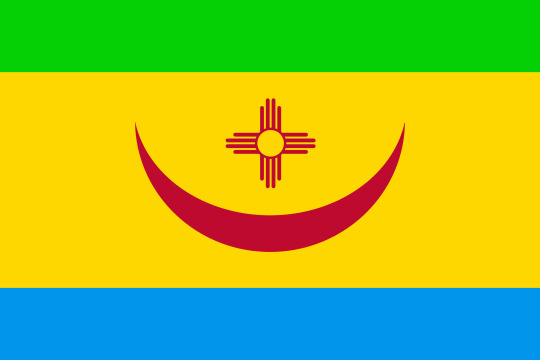
This is the flag of the Pueblo Sultanate. It comes from a world where the Ottoman Empire established colonies in the New World. The Ottomans began in the Caribbean, and soon went on to conquer Mexico. Eventually, the Ottomans made their way to the American Southwest, and subjugated the Pueblo peoples. Life was harsh for the Pueblo people under Ottoman colonialism. Pueblo people were forced to toil away in silver mines to feed the Ottomans’ hunger for precious metals. Several madrasas were established with the intent to convert the Pueblo peoples to Islam. In theory, the madrasas would provide aid, education, and social services to the Pueblo people. In practice, however, the imams often subjected their charges to horrific abuse. Despite this, Islam did manage to spread among the Pueblo peoples. The Pueblo peoples begged for a savior. But where could he be?
The Pueblo people received their answer in the form of a charismatic preacher named Po’Pay. Despite the similar name, he is a separate individual from the Po’Pay of our world. This Po’Pay preached the highly syncretic religion that combined indigenous Pueblo beliefs with Islamic liberation theology. This was in sharp contrast to the Islam of the Ottomans, which frowned upon syncretism, and suppressed indigenous beliefs. Po’Pay teachings began to spread, and soon Po’Pay a revolt against the Ottomans. Though the fight was hard, at last the Pueblo peoples were free from the Ottoman yoke. The Pueblo peoples began to think of themselves not as a collection of disparate tribes, but as a united people sharing in a common destiny.
Po’Pay organized the tribes into a sultanate, with himself as the first sultan. However, the sultan would not rule alone. An assembly of tribes was created. Representatives of each tribe could voice the opinions and concerns of the tribe to the assembly. Thus, the Pueblo Sultanate became the first representative monarchy in the New World. The Pueblo Sultanate stretches over much of what would be he American Southwest.
The Pueblo Sultanate is famous for begin very tolerant, open-minded, and accepting of peoples with different beliefs. Most citizens practice Pueblo Islam, but don’t try to push it on other people. Most women do not veil, and most Pueblo citizen wear traditional indigenous-style clothing. to Po’Pay developed a written script based upon Arabic, and the Pueblo Sultanate is home to several libraries and other centers of learning. In fact, the Great Pueblo Library is world renown for its expansive collection of books. Qurans are written in the Pueblo script, and the call to prayer to announced in the various Pueblo languages. The Pueblo Sultanate is also quite famous for its cooking. Pueblo cuisine combines cooking techniques from the Eastern Mediterranean with spices and ingredients of the American Southwest. The Pueblo Sultanate has a noticeable minority of Greeks, Serbians, Bulgarians, and Amazighs. They are mostly descended from slaves brought over during the days of Ottoman colonialism.
Also, the Pueblo Sultanate isn’t actually called the Pueblo Sultanate in-universe, but I couldn’t think of a better name.
The flag includes the sun symbol of the Zia people, and the crescent moon of Islam. This is a reference to the Sultanate’s mixed indigenous and Islamic heritage. The blue band represents turquoise, an important stone to many Pueblo peoples. The green band represents prosperity, and green is a color associated with Islam. The yellow band is there because it goes well with everything else.
Link to the original flag on my blog: https://drakoniandgriffalco.blogspot.com/2022/06/flag-of-pueblo-sultanate.html?m=1
#alternate history#flag#flags#alternate history flag#alternate history flags#vexillology#alt history#Pueblo Sultanate#Pueblo Tribes#Pueblo Peoples#american southwest#Ottoman Empire#Islam#native americans#native american#indigenous people#indigenous#Pueblo#america#north america#united states#USA#united states of america#Pueblo People
23 notes
·
View notes
Text
The full story of the Palestine-Israel war
Where did the idea come from ?
The British promised for the first time to establish a homeland for the Jewish people in Palestine on November 2, 1917 , in a letter addressed to the United Kingdom Foreign Secretary Arthur Balfour, after Britain became the mandatory power over Palestine after the fall of the Ottoman Empire.
In 1947, UN Resolution 181 proposed the creation of separate Jewish and Arab states, paving the way for founding of Israel the following year.
Was there opposition ?
Arab leaders opposed the establishment of Jewish state from the beginning, and the issue helped spark a broader revolt against the British Mandate in 1936.
The Arabs lost their war Jews in 1948, the State of Israel was established and the Palestinians were dispersed and displaced after what was known as the Nakba.
The Israelis took control of new, broader lands than what was stipulated in the UN proposal.
After that, the Kingdom of Jordan annexed the West Bank, and Egypt administered the Gaza Strip, until 1967 , when Israel occupied these land.
The Palestine Liberation Organization was founded in 1964 with the aim of regaining all of Palestine.
Under international law, Palestinian territories remain occupied to this day, and Israel settlements established there are illegal.
Successive Israeli governments have encouraged settlement in the West Bank and East Jerusalem, complicating all negotiations over potential Palestinian state.
Was it close to happening ?
The Palestine Liberation Organization fought many battles with Israel.
The fiercest of these battles took place in 1982 in Beirut, the Lebanese capital, where the organization headquarters was before it moved to Tunisia.
The Liberation Organization began to change its strategy and adopted the idea of two states, and declared the State of Palestine abroad in 1988.
In 1991 , the Madrid Peace Conference was held in October, co-sponsored by the United States and the Soviet Union. It was an attempt by the international community to revive the Palestinian-Israel peace process through negotiations between Israel, the Palestinians, and Arab countries, including Jordan, Lebanon, and Syria.
On September 13, 1993, the world was surprised by the announcement of the Oslo Accords in Washington when then-the Palestinian leader Yasser Arafat shook hands with Israeli Prime Minister Yitzhak Rabin on the White House lawn under the watchful eye Bill Clinton, it sparked hope for peace.
The historical Oslo Accords created limited Palestinian self-rule under the name “Palestinian Authority,” headquartered in Ramallah, with the ultimate goal of creating a Palestinian state whose people would live in freedom and peace alongside Israel.
In 2002 the Arab Peace Initiative was based on the principle of a two-state solution, and proposed the establishment of a Palestinian state in exchange for normalizing relations between Arab countries and Israel, in the context strengthening the chances of a solution.
But that didn’t happen ?
The assassination of a Jewish extremist who opposed the Oslo Rabin Conventions in 1995, opened the way for decades of violence and stalled negotiations. Since Rabin’s assassination and the rise of Likud, which opposes the establishment of Palestinian state and The Oslo Accords, settlement has begun to expand.
Israel hadn’t implemented the Oslo Agreement by transferring areas form the Israeli Authority to the Palestinian Authority, and peace negotiations g had taken place.
In 2006, a rift between Hamas and Fatah took place following Hamas’ victory in the legislative elections, and after armed clashes, Hamas took control of the Gaza Strip and removed Fatah from it. Palestinian divisions complicated the unification of the Palestinian attitude towards Israel.
In this context, Xavier Gainyard of the Paris-based Noria Research Foundation said that the international community had last made efforts in serious talks in 2013 " Politically, we have seen no effort to make this possible since then ,"
What do the parties say now ?
The Palestinian Authority formally supports the two –States situation.
Palestinian President Mahmoud Abbas called for an international conference on the issue last September, saying it “ may be the last chance to save the two-state situation”.
In 2017 , Hamas said for the first time that it accepted the principle of establishing a Palestinian state within the pre-1967 borders, while retaining a far-reaching goal of “ liberating “ all historical Palestine.
For its part, the current Israel government headed by Benjamin Netanyahu rejects ant talk of Palestinian statehood.
Some ministers put forward the idea of opening the door for forced or voluntary displacement to Palestinians in Gaza.
What do people think ?
Support for the “ two-State solution” has declined considerably on both sides.
A Pew poll said support for this solution by Jewish Israelis before the current war fell from 46% in 2013 to 32% last year.
A pre-war Gallup survey also reported that support among Palestinians in Gaza and the West Bank fell from 59% in 2012 to 24% last year.
This is the story, very briefly, and I also did not mention the massacres that Israel committed against the Palestinian people in Rafah and Gaza.
4 notes
·
View notes
Text






























The parliament of Transjordan made Abdullah I of Jordan their Emir on May 25, 1946.
Jordan’s Independence Day
Jordan’s Independence Day is celebrated on May 25 every year, and is the most important event in the history of Jordan, as it commemorates its independence from the British government. After World War I, the Hashemite Army of the Great Arab Revolt took over the area which is now Jordan. The Hashemites launched the revolt, led by Sharif Hussein, against the Ottoman Empire. The Allied forces, comprising Britain and France supported the Great Arab Revolt. Emir Abdullāh was the one who negotiated Jordan’s independence from the British. Though a treaty was signed on March 22, 1946, it was two years later when Jordan became fully independent. In March 1948, Jordan signed a new treaty in which all restrictions on sovereignty were removed to guarantee Jordan’s independence. Jordan joined and became a full member of the United Nations and the Arab League in December 1955.
History of Jordan Independence Day
The first appearance of fortified towns and urban centers in the land now known as Jordan was early in the Bronze Age (3600 to 1200 B.C.). Wadi Feynan then became a regional center for copper extraction with copper at the time, being largely exploited to facilitate the production of bronze. Trading, migration, and settlement of people in the Middle East peaked, thereby advancing and refining more and more civilizations. With time, villages in Transjordan began to expand rapidly in areas where water resources and agricultural land abound. Ancient Egyptians then later expanded towards the Levant and would eventually control both banks of the Jordan River.
There was a period of about 400 years during which Jordan was under the rule and influence of the Ottoman Empire, and the period was characterized by stagnation and retrogression to the detriment of the Jordanian people. The reign of the Ottoman Empire over Jordan would eventually cease when Sharif Hussein led the Hashemite Army in the Great Revolt against the Ottoman Empire, with the Allies of World War I supporting them. In September 1922, the Council of the League of Nations recognized Transjordan as a state under the terms of the Transjordan memorandum. Transjordan remained under British mandate until 1946, when a treaty was signed, with eventual sovereignty being granted upon signing a subsequent treaty in 1948.
The Hashemites’ assumption of power in the Jordan region came with numerous challenges. In 1921 and 1923, there were some rebellions in Kura which were suppressed by the Emir’s forces, with British support. Jordan is generally a peaceful region today, and it has become quite a tourist destination in recent times.
Jordan Independence Day timeline
3600 B.C. Earliest Known Jordanian Civilizations
Fortified towns and urban centers begin to spring up in the area now known as Jordan.
1922 Jordan is Recognized as a State
In 1922, the Council of the League of Nations recognizes Jordan as a state under the Transjordan memorandum.
1946 First Independence Treaty is Signed
In 1946, Emir Abdullāh negotiates the first independence treaty with Britain which would later lead to Jordan's ultimate independence in 1948.
1955 Jordan Joins the United Nations
Jordan becomes a member of the United Nations and the Arab League in 1955.
Jordan Independence Day FAQs
What day is Jordan’s Independence Day?
Jordan’s Independence Day is May 25, every year. It marks the anniversary of the treaty that gave Jordan her sovereignty.
When did Jordan become independent?
On May 25, 1948, Jordan officially became an independent state.
Who is Jordan’s current leader?
The current ruler Of Jordan is the monarch, Abdullah II bin Al-Hussein, King of Jordan.
How to Observe Jordan Independence Day
Light up some fireworks
Prepare some mansaf
Share on social media
One of the hallmark celebrations of any independence day is the show of fireworks. Be sure to be a part of the beauty!
As you probably already knew, Mansaf is Jordan’s national dish. As such, preparing it on such a special day as Independence Day is a brilliant idea.
Take pictures and videos of you in your dishdasha celebrating Independence Day. Share them on your social media!
5 Interesting Facts About Jordan
Home to the Dead Sea
A nexus between Africa, Europe, and Asia
Over 100,000 archeological sites
The world’s oldest dam
Jesus was baptized in Jordan
The Dead Sea, which is the lowest point on Earth, is located in Jordan.
Jordan is a pivotal point connecting Africa, Asia, and Europe.
Jordan has over 100,000 archeological and tourist sites.
Jordan is home to the world’s oldest dam, the Jawa Dam.
Jesus, who is the symbolic character of the Christian faith, was baptized in the Jordan River before beginning his ministry.
Why Jordan Independence Day is Important
Jordan is peaceful and liberal
The weather in Jordan is nice
Jordan is a tourist’s dream
Though a generally conservative country, Jordan is relatively liberal. The country is peaceful and tolerant of foreign cultures.
Jordan is a warm region. The weather is usually warm and pleasant at all times of the year.
Jordan has everything a tourist could dream of. Beautiful sights, calm weather, a welcoming culture, and amazing people make it a fantastic place for tourists.
Source
#Petra#Amman#Aqaba Fortress#Aqaba#Jerash#ruins#architecture#travel#archaeology#cityscape#tourist attraction#landmark#landscape#summer 2007#Jordan#Asia#Middle East#Gadara#Dead Sea#Wadi Mujib#Wadi Rum#desert#Kerak Castle#Abdullah I of Jordan#Emir#25 May 1946#anniversary#Jordan history#vacation#Jordan’s Independence Day
4 notes
·
View notes
Photo

At times they are good and quiet company, the dead; they will not interrupt your musings, but when they speak, whether they be Jews or Turks or heathens, they will speak in a tongue all can understand. there are even countries where the moving, breathing people are less intelligible, dwell in a world further apart form you, than that silent population under the earth.
- Gertrude Bell, Persian Pictures (1894)
They buried her in Baghdad. This is the short sentence ending the biography of one of the most important women in recent Middle Eastern history. Gertrude Bell, "Queen of the Desert", as the film by Werner Herzog called her. Or "Mother of Iraq", as the inhabitants of the region between the Euphrates and the Tigris describe the woman who brought them both a blessing and a curse.
The search for her grave in the Iraqi capital is something akin to a small-scale odyssey. She is not buried at the British memorial cemetery in the heart of Baghdad in Bab al-Muadam. In this cemetry lie soldiers of his majesty, King George V of Great Britain. Most fell in 1917. A small mausoleum has been erected on the extensive site for Sir Frederick Stanley Maude. The General made a name for himself in the campaign on the Mesopotamian front during the First World War, as conqueror of Baghdad. Following the invasion of Iraq by British and American troops in 2003, the British named their headquarters in Baghdad's Green Zone "Maude House".
She’s not even buried in the Christian Armenian cemetery. When the woman that created Iraq died, on 12 July 1926 in her adoptive city of Baghdad in circumstances still unexplained to this day, she had already lost considerable influence.
A secret agreement between the governments of Britain and France had already decided on the allocation of the Ottoman spoils of war. But it would be another two years before the final demise of the Turkish Empire. Nevertheless, the new Middle Eastern order was a done deal and would from that moment bear the signature of Gertrude Bell.

Initially an unofficial employee of the British secret service, and later as a political liaison officer ranked as a major and 'oriental secretary', she played a decisive role in the foundation of modern Iraq and was a close confidante of the Iraqi King Faisal I, who initially became King of Syria. When the French hounded him out, the British installed him in Baghdad on Bell's insistence.
Thereafter, the Hashemite King no longer needed Bell and the English also distanced themselves from a woman who was highly unusual for her time. This explains why she did not find her final resting place at the British memorial cemetery.
There was intense animosity between Gertrude Bell and Mark Sykes, one of the two leaders in the negotiations to reach the secret agreement. He called her a "flat-chested, man-woman, globe-trotting, rump-wagging, blathering ass." She, meanwhile, accused him of huge incompetence.
This is because the agreement forged by Sykes together with his French counterpart Francois Georges-Picot was controversial at the time of its signing. Picot was the far more experienced partner in the negotiations and knew how to secure much more for France than expected. The agreement also contained serious contradictions. Whereas previously, Britain had pledged it would support the Arabs in the event of a revolt against the Ottoman Empire, and the prospect of recognising a subsequent Arab independence had been set out, France and Britain were now dividing up huge areas of the Arab territory between them and creating nations like Syria and Iraq.
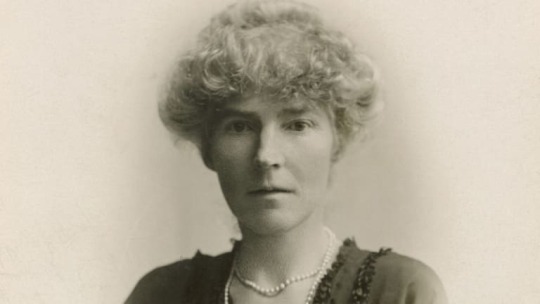
The Sykes-Picot agreement did however also contain, in the first paragraph, a reference that both France and Britain were willing to recognise and protect an independent Arab nation in the regions of the map marked with A and B. But within their spheres of influence, both countries retained privileges that would remain in place until the 1950s.
Gertrude Bell, who although employed in the service of the British, always lobbied for the interests of the Arabs, did not agree. Mark Sykes did not care. He was more interested in the fate of the Armenians, who had suffered under the pressure of the Ottoman Empire, than for the retention of the Arabs and the Kurds and threw his weight behind the emerging ambitions of the Jews for a territory in Palestine.
The development shows how bloody conflicts grew from these differing interests, and how these conflicts are now being exacerbated. The forcing together of the three ethnically and religiously diverse provinces of Mosul, Baghdad and Basra brought misfortune to Iraq. The kingdom was always unstable, and was toppled in a military putsch in 1958. The socialist Ba'ath Party seized power in 1968, and Saddam Hussein established his dictatorship in 1979. He held the nation together with what can only be described as archaic brutality.
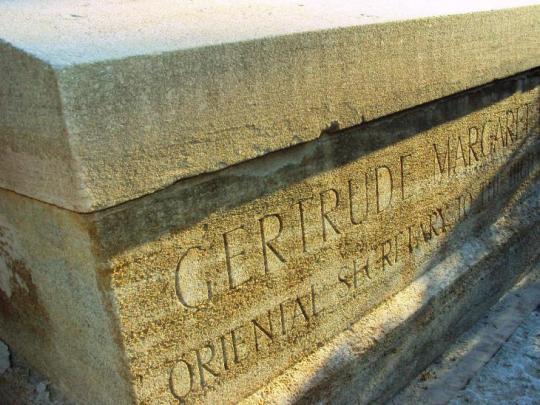
If you want to see the final resting place of Gertrude Bell you will have to find the small Anglican cemetery in the "Bab el-Sher Shi" neighbourhood on the eastern banks of the Tigris.
In the midst of mosques, churches, ministerial buildings, pot-holed streets and endless queues of cars, stands a stone sarcophagus with the inscription: Gertrude Margaret Lowthian Bell. A small bouquet of red and white plastic roses has been placed upon it.
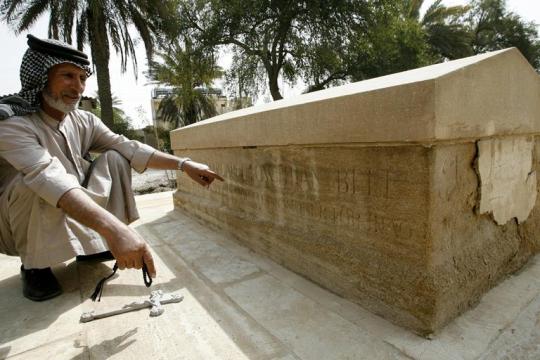
Asked about the significance of the dead woman to his country, an Iraqi friend says diplomatically: "There are good and bad sides to everyone." The same applied to Miss Bell. On the one hand she was responsible for the unfortunate border demarcation and the entity that is Iraq, which did not exist previously. But on the other, she was a perpetual champion of the cultural heritage of the nation and founded the Iraqi national museum. "She spoke our language, knew our clans, our customs and traditions,"
What she didn't know, my friend suggested, were the differences between Sunnis, Shias, Arabs and Kurds. "If she had, much of this could have been avoided."
#bell#gertrude bell#quote#cemetery#first world war#iraq#british#femme#archaeologist#culture#society#politics#imperialism#icon
35 notes
·
View notes
Text
Lawrence of Arabia. The man, the myth and the facts
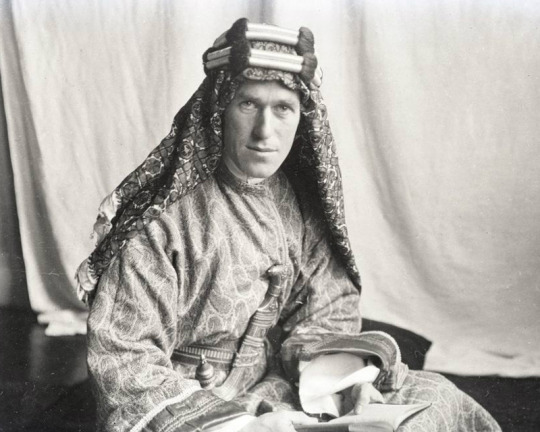
Few British soldiers have a greater legend attached to them than Colonel TE Lawrence - better known as Lawrence of Arabia. His military and diplomatic efforts have drawn some distinction.
But it is Lawrence’s immense cultural impact in the century since his First World War exploits that has attracted the most attention.
Thomas Edward Lawrence was born in Tremadog, Wales on 16th August 1888. From a young age he exhibited an active interest in architecture, monuments and antiquities.
Between 1907 and 1910, Lawrence studied History at Jesus College, Oxford. During this time, he toured France by bicycle, collecting photographs, drawings and measurements of medieval castles.
This would form the basis of his dissertation. In 1909, he completed a remarkable solo 1,000-mile trek through Ottoman Syria visiting Crusader castles.
Following his studies, Lawrence became an archaeologist. He worked in Egypt, Palestine and Syria, at that time all part of the Ottoman Empire.
This first-hand knowledge and experience earned him a posting to Cairo after he enlisted in the British Army in October 1914. He served in the intelligence staff of the British Middle East Command in the First World War campaign against the Turks.
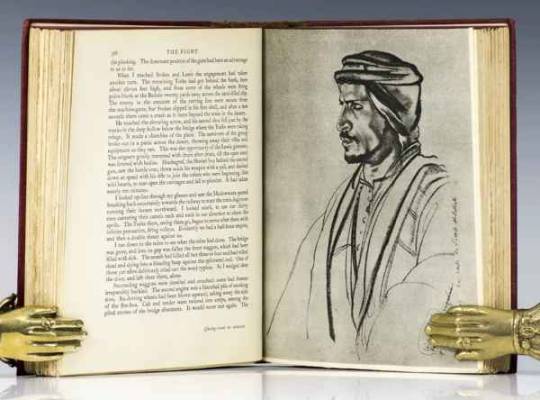
Seven Pillars of Wisdom is a biographical account of T.E. Lawrence's experiences during the Arab Revolt of 1916–18, when he was based in Wadi Rum (now a part of Jordan) as a member of the British Forces.
With the support of Emir Faisal and his tribesmen, he helped organize and carry out attacks on the Ottoman forces from Aqaba in the south to Damascus in the north. You can also listen to Seven Pillars of Wisdom on Audible.
#manchester#iraq#iraqi#london#uk#baghdad#liverpool#scotland#hussein al-alak#usa#lawrence of arabia#t e lawrence#syria#palestine#british army#british history#ww1 history#ww1#military history#world war one
6 notes
·
View notes
Text
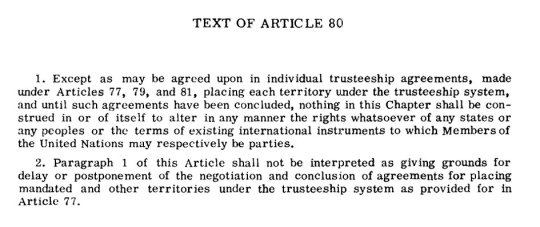

@shlomo_fishman
One of the main foundations of the Palestinian narrative states that: "according to international law, Israel is occupying Palestinian land".
What most people don't know is that the international law states, in fact, the exact opposite. I'll explain.
In the picture below, you can see article 80 in the UN charter, signed by the UN in 1945 during the San Francisco convention. As stated, its purpose was to ensure the rights given by trusteeship agreements approved by the UN, one of them being the British Mandate which officially began in 1920 and was designated to the establishment of a "national home" for the Jewish people on the area shown in the map below, as previously declared in the Balfour Declaration in 1918.
Now you may say: "but what about the UN general assembly Resolution 181 (the partition plan)?". The answer here is pretty simple: first of all, the general committee has no official power to enforce their decisions, which are mostly symbolic. Second, the plan was never set in motion, as the Arab leadership refused to accept it and the war between the Jewish population and the Arab one, broke down. Regarding the UN security council, Article 24(2) states: "the Security Council shall act in accordance with the Purposes and Principles of the United Nations". Which means it also cannot overrule article 80 in the UN charter.
There is also an argument I heard, about the British Mandate being a class A mandate. Class A mandates, were territories formerly controlled by the Ottoman Empire that were deemed to "... have reached a stage of development where their existence as independent nations can be provisionally recognized subject to the rendering of administrative advice and assistance by a Mandatory until such time as they are able to stand alone. The wishes of these communities must be a principal consideration in the selection of the Mandatory". There is one major problem with this argument: the Muslim Arabs NEVER had any national ambitions back then, nor wanted an independent state until after 1948.
Haj Amin Al-Husseini, probably the most prominent Muslim leader during the British Mandate and the Mufti of Jerusalem at that time, who dedicated his life to combat Zionism and purge the Jewish population in the area, even reaching Adolf Hitler at some point to help him fulfill those plans, never wanted an establishment of an independent Muslim state.
While launching massacres against the Jewish population (the great Arab revolt, 1929 Arab riots and more) and trying to convince Arabs not to sell lands to Jews, he justified it only using religious Islamic motives and blood libels against the Jews. Their only mission was to erase Zionism, so there was never an appeal by him, nor the Arab League and not any other Muslim leadership of that time to the international community, for the establishment of a Muslim state called "Palestine".
So when I define the Palestinians as: "a political movement pretending to be a nation, only to combat Zionism", I talk about this exactly.
This text sums up the main things you should know about the non-existent Israeli occupation, which many people unfortunately don't. So it was very important to me to write about it, especially in these difficult times, and I'd appreciate your support in spreading this message, a lot.
79 notes
·
View notes